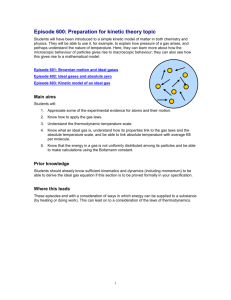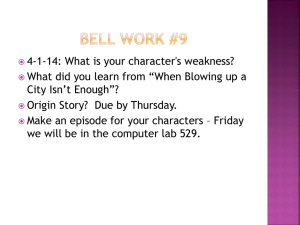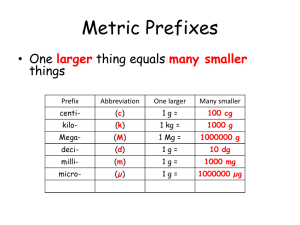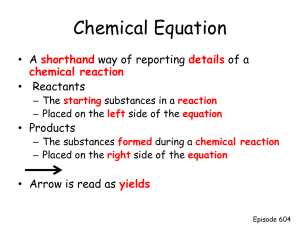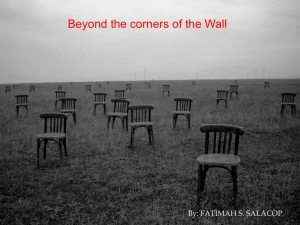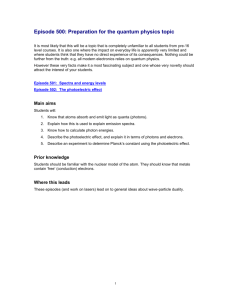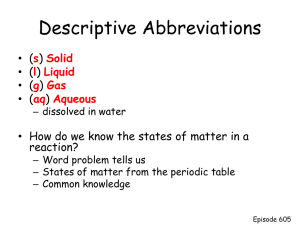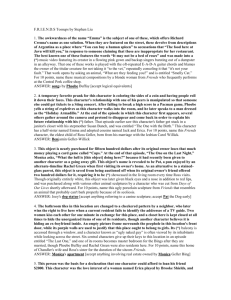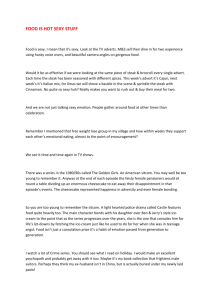journal entry—clinical practice episode
advertisement
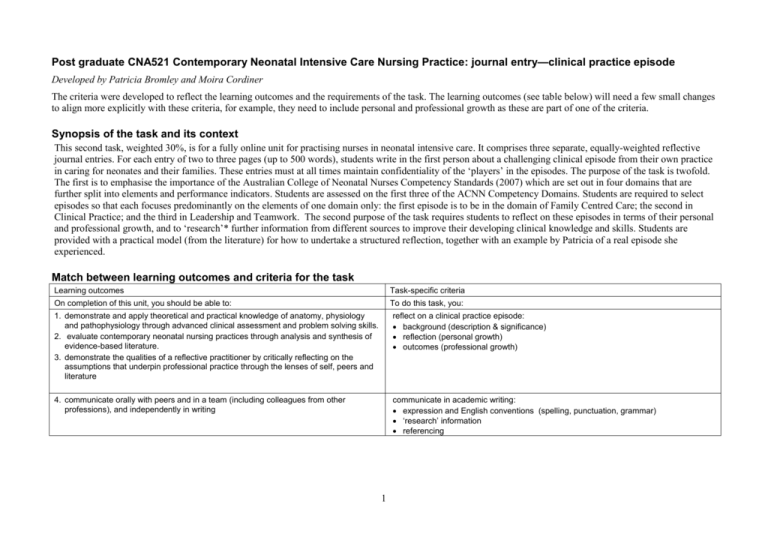
Post graduate CNA521 Contemporary Neonatal Intensive Care Nursing Practice: journal entry—clinical practice episode Developed by Patricia Bromley and Moira Cordiner The criteria were developed to reflect the learning outcomes and the requirements of the task. The learning outcomes (see table below) will need a few small changes to align more explicitly with these criteria, for example, they need to include personal and professional growth as these are part of one of the criteria. Synopsis of the task and its context This second task, weighted 30%, is for a fully online unit for practising nurses in neonatal intensive care. It comprises three separate, equally-weighted reflective journal entries. For each entry of two to three pages (up to 500 words), students write in the first person about a challenging clinical episode from their own practice in caring for neonates and their families. These entries must at all times maintain confidentiality of the ‘players’ in the episodes. The purpose of the task is twofold. The first is to emphasise the importance of the Australian College of Neonatal Nurses Competency Standards (2007) which are set out in four domains that are further split into elements and performance indicators. Students are assessed on the first three of the ACNN Competency Domains. Students are required to select episodes so that each focuses predominantly on the elements of one domain only: the first episode is to be in the domain of Family Centred Care; the second in Clinical Practice; and the third in Leadership and Teamwork. The second purpose of the task requires students to reflect on these episodes in terms of their personal and professional growth, and to ‘research’* further information from different sources to improve their developing clinical knowledge and skills. Students are provided with a practical model (from the literature) for how to undertake a structured reflection, together with an example by Patricia of a real episode she experienced. Match between learning outcomes and criteria for the task Learning outcomes Task-specific criteria On completion of this unit, you should be able to: To do this task, you: 1. demonstrate and apply theoretical and practical knowledge of anatomy, physiology and pathophysiology through advanced clinical assessment and problem solving skills. 2. evaluate contemporary neonatal nursing practices through analysis and synthesis of evidence-based literature. 3. demonstrate the qualities of a reflective practitioner by critically reflecting on the assumptions that underpin professional practice through the lenses of self, peers and literature reflect on a clinical practice episode: background (description & significance) reflection (personal growth) outcomes (professional growth) 4. communicate orally with peers and in a team (including colleagues from other professions), and independently in writing communicate in academic writing: expression and English conventions (spelling, punctuation, grammar) ‘research’ information referencing 1 Student name Student number Journal entry about a clinical practice episode criteria HD DN In your journal entry you: Reflect on a clinical practice episode: background (description & significance) reflection (personal growth) outcomes (professional growth) provided a background of the episode with: a description that: correctly related your actions to the relevant Domain Elements was a detailed and thorough recollection that gave the reader a holistic view a perceptive explanation of what had the most significance for the baby and/or the family and why objectively (mentally ‘stood back’) and insightfully reflected on your personal growth from the episode, through ‘sensemaking’: thoroughly analysing it by identifying and explaining your thoughts and feelings generated during and/or after the episode making an evaluation of how much significance the episode had for you personally, by: judging the extent to which your knowledge, values, assumptions, and/or beliefs were affected briefly outlined an action plan for your professional growth by: identifying your immediate learning needs from your reflection, to ‘research’* specific and contemporary information, focussing on the key aspects of the episode CR In your journal entry you: PP In your journal entry you: provided a background of the episode with: a description that: correctly related your actions to the relevant Domain Elements was a detailed and thorough recollection provided a background of the episode with: a description that: correctly related your actions to the relevant Domain Elements was a partly detailed recollection an explanation of what had the most significance for the baby and/or the family and why an explanation of what had significance for the baby and/or the family and why objectively (mentally ‘stood back’) reflected on your personal growth from the episode, through ‘sensemaking’ by: you subjectively reflected on your personal growth from the episode, through preliminary ‘sensemaking’: thoroughly analysing it by identifying and explaining your thoughts and feelings generated during and/or after the episode making an evaluation of how much significance the episode had for you personally, by: exploring how your knowledge, values, assumptions, and/or beliefs were affected briefly outlined an action plan for your professional growth by: identifying your immediate learning needs from your reflection, to ‘research’* specific and mostly contemporary information about the episode 2 analysing it by identifying and explaining your thoughts and feelings generated during and/or after the episode making an evaluation of how much significance the episode had for you personally by: stating whether your knowledge, values, assumptions, and/or beliefs were affected briefly outlined an action plan for your professional growth by: identifying some learning needs from your reflection, to ‘research’* contemporary and relevant and information about the episode In your journal entry you: provided a background of the episode with: an outline that: correctly identified the relevant Domain Standard/s was a simple list of events a statement that there was significance for the baby and/or the family you partially reflected on your personal growth from the episode through: identifying your thoughts and feelings generated during and/or after the episode making a broad evaluation of how much significance the episode had for you personally briefly outlined an action plan for your professional growth by: identifying some general learning needs from your reflection, to ‘research’* contemporary and relevant information about the episode Student name Student number Journal entry about a clinical practice episode criteria Communicate in academic writing: expression and English conventions (spelling, punctuation, grammar) ‘research’ information referencing Comments HD DN CR explaining how you would successfully use this new knowledge and/or skills to guide your clinical practice consistently communicated: explaining how you would successfully use this new knowledge and/or skills to guide your clinical practice predominantly communicated PP explaining how you would use this new knowledge and/or skills in your clinical practice communicated stating that this new knowledge and/or skills would be used in clinical practice communicated by maintaining confidentiality of families in your care, hospital, ward, clinicians, colleagues etc in fluent academic writing by: in fluent academic writing by: using coherent, concise and cohesive expression by adhering to English conventions in fluent academic writing by: in academic writing by: using coherent and partly cohesive expression by adhering to English conventions accurately referencing all ‘research’ sources using the specified UTAS School of Nursing & Midwifery 2011 version of the Harvard referencing guide accurately referencing most sources using the specified UTAS School of Nursing & Midwifery 2011 version of the Harvard referencing guide Grade For the purposes of this task ‘researching’ includes, e.g. reading some relevant literature, seeking expert clinician opinions, advice from professional organisations, comments and/or opinions from parents, searching the internet. Grades are awarded according to the following algorithm: HD – High Distinction standard in criterion 1 and no less than a DN in criterion 2 DN – Distinction standard in criterion 1 with at least a CR in the criterion 2 CR – Credit standard in criterion 1 with at least a PP in the criterion 2 PP – Pass standard in both criteria NN – Fail standard in at least one criterion 3
